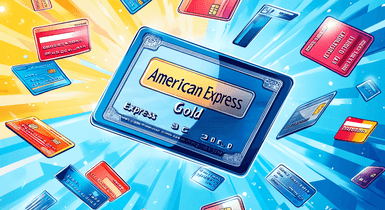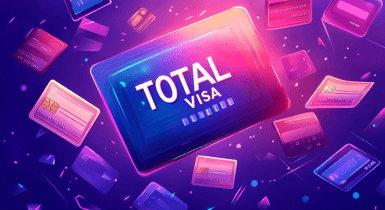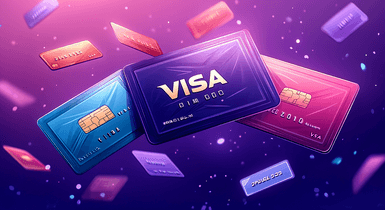Difference Between Visa, Mastercard, American Express, and Discover Cards
Contents

Currently, about 37% of Americans pay for purchases with credit cards. Visa, Mastercard, Discover, American Express cards are the most widespread in the USA. What are their similarities and differences? Which cards are more beneficial for traveling, and which are better suited for everyday expenses? This article will provide the answers.
Visa vs. Mastercard vs. Discover vs. American Express
Visa
Visa is a global payment network company that partners with different financial institutions to issue cards. It offers credit, debit, and gift cards to customers and enables quick money transfers both within the country and around the world. All online transactions conducted with a Visa plastic are highly protected by VISA Secure personal identification technology. All Visa cards feature a microchip, a magnetic stripe, and a 16-digit account number.
For example, in the Visa Signature vs. Infinite battle, you can easily choose your favorite by reading our article.
Mastercard
MasterCard is the second most popular payment system in the world. You can use its credit, debit, or prepaid cards in 210 countries. With this network, you can make quick and easy payments online and offline and receive bonuses for shopping in partner stores. The innovative contactless payment technology makes this system even more convenient.
American Express
American Express (AmEx) is one of the oldest and largest payment systems in the United States. If you ask, “Is AmEx Visa or Mastercard better?” It’s neither. American Express is a financial institution that issues its own credit, debit, and prepaid cards. It offers various perks, including bonus points, cashback, and travel benefits.
Discover
Is Discover a Mastercard? No, it’s not. Discover is a separate leading American financial services corporation and payment network that issues its own credit cards. It offers a variety of credit plastic options, including student cards. They are widely recognized for their customer-friendly features, such as no annual fees, cashback benefits, and robust fraud protection.

Issuing Banks/Types of Cards
AmEx and Discover have a critical difference from Visa and Mastercard. The latter are in the business of making payments through their payment networks but are not able to issue payment cards themselves. They also don’t interact with end cardholders: you can’t go to the office of Visa or Mastercard and issue a card directly; you’ll have to do it through some third party, like a bank, fintech, or airline, depending on the card type.
If someone asks, “Is Discover Visa or Mastercard?” or even, “Is American Express Visa or Mastercard?” the answer is simple: neither. AmEx and Discover are both payment systems and financial institutions, so they can issue cards independently.
Merchant Acceptance
Most major retailers accept all 4 cards in the USA. Still, American Express cards are less popular and not accepted as widely as Visa or Mastercard. However, it’s starting to change. In 2024, over 1,500 US e-commerce sites accept payments via AmEx. Yet, AmEx and Discover are not as accepted internationally. So, if you travel abroad a lot and are considering Visa vs. Mastercard vs. AmEx, stick to the first two options.
Merchant Cost
Even though merchants accept various credit card types: Visa, Mastercard, American Express, and Discover, some of them are not willingly accepted. The most important distinction between the four networks for businesses is the cost of support. When a consumer pays for something with a card, the credit card network charges the merchant an interchange fee to execute the transaction. Each network has a different processing charge amount, which can be a reason why merchants prefer some cards over others. For example, American Express cards charge merchants a higher commission on average. Depending on the card and merchant type, it typically varies from 1.15% to 3.15% per transaction. It’s almost one and a half times higher than Mastercard charges, so it’s not surprising that it’s much more popular.
Fringe Benefits
Another distinction lies in the fringe benefits offered to cardholders. Some benefits are available across various payment networks, while others are unique to specific cards. For instance, Visa Infinite cardholders can request compensation for the non-refundable portion of a passenger fare if they need to cancel or interrupt their trip. This card also offers a Trip Delay Reimbursement perk, providing refunds for unexpected expenses up to $500 if a flight is delayed for more than six hours.
Visa, Mastercard, Discover, American Express: Pros & Cons
Each payment network has significant benefits and certain drawbacks. Before applying for any card, you need to realize your opportunities and understand what’s crucial to you.
Visa
Pros | Cons |
|---|---|
Provides different levels of cards with profitable bonuses | Can’t issue its own cards |
Charges low interest | Less beneficial to non-US citizens while traveling abroad due to currency conversion |
Accepted worldwide by over 100 million merchants |
|
Offers both secured and unsecured options | |
Issued by multiple banks with generous reward plans | |
Has offers for good and bad credit scores |
By knowing and understanding Visa card meaning, you can easily choose the best Visa card for your needs.
Mastercard
Pros | Cons |
|---|---|
Offers various levels of cards with rewarding bonuses | Can’t issue its own cards |
Widely accepted in 210 countries and millions of merchants | Less beneficial to US citizens while traveling abroad due to currency conversion |
Offers both secured and unsecured options | Inability to link additional cards |
Has options with low interest rates |
|
Issued by multiple banks with generous reward plans |
American Express
Pros | Cons |
|---|---|
Interest-free credit line | No card alternatives for people with bad credit |
Offers its own credit cards with travel benefits | Higher commission rate compared to Visa and Mastercard |
Payments are processed very quickly | Limited credit card choices for balance transfers |
A wide range of payment cards with various favorable terms and customer security | Not as globally accepted as credit cards from Visa and Mastercard |
Discover
Pros | Cons |
|---|---|
Offers its own credit cards | Not as globally accepted as credit cards from Visa and Mastercard |
No annual and foreign transaction fees | Doesn’t provide any substantial travel perks |
Provides favored credit cards with cashback system |
|
The Latest Transformations and Trends
Visa, Mastercard, American Express, and other credit card companies are constantly seeking new methods to increase the security of virtual and in-store payments. They use diverse innovations for this purpose that also make it easier to operate payments for customers.
Enhanced International Money Transfers
These years people make overseas transfers regularly, so it’s vital to simplify this process. Visa is improving cross-border money transfers through the acquisition of Currencycloud to enable faster, more secure transactions in more than 180 countries and 35 currencies. Visa focuses on reducing fees, improving settlement times, and increasing transparency to address long-standing challenges.
Amex Tries to Sort Out the Supply Chain Problem
American Express uses several technologies and strategies to improve supply chain issues. These include boosting data visibility across all supply chain tiers, diversifying and regionalizing suppliers to mitigate risks, and implementing training programs for employees. They also leverage emerging technologies like hyper-automation and smart sensors to enhance efficiency, situational awareness, and real-time decision-making.
Increased AI Deployment
Visa utilizes over 60 AI capabilities to fight fraud. These AI models help prevent fraudulent activities, enabling faster consumer payments and improved payment experiences during bank outages. By pioneering AI in payments, Visa ensures a secure and efficient payment process, safeguarding users against increasingly sophisticated fraud tactics exploiting generative AI technologies.
By the way, you can check Visa gift card balance very easily. Read more about this in our article.
Crypto Integration
Mastercard integrates cryptocurrency through its Crypto Card Program, which enables users to make everyday purchases using crypto assets. The program collaborates with licensed crypto platforms and exchanges, allowing them to issue branded crypto cards. These cards convert crypto to fiat currency in real time, making transactions seamless for consumers. In addition, Mastercard’s compliance, security, and innovation capabilities are bridging traditional finance and growing digital currency markets.

Conclusion
Mastercard, Visa, Discover, American Express, and other payment systems all provide fast, reliable, and convenient transactions. Therefore, the distinctions are not always noticeable to the average person. For international travelers, it’s important to know which card network is more popular in the countries they frequently visit. However, when making domestic payments, the differences are minimal. When choosing a credit card, consider what best meets your needs, regardless of the network it belongs to.




